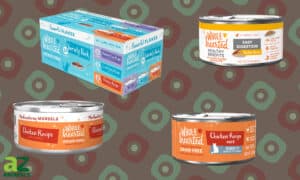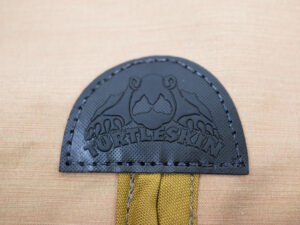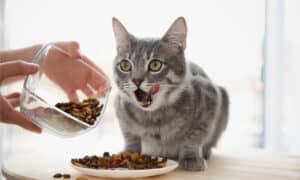| Best for | Product |
|---|---|
| Best Overall | Pet Naturals Daily Probiotic Cat Chews |
| Best Lubricant | LaxAire Gentle Laxative and Lubricant for Cats Dogs |
| Best Liquid | Pet Wellbeing BM GOLD Liquid Digestive Supplement |
Our feline friends, like humans, might get constipated from time to time. Constipation can have a negative impact on your cat’s energy and overall mood. It’s fairly common for a veterinarian to offer a stool softener for your pet to help things move things along.
Because a variety of causes might induce constipation in our pets, it’s critical to consult a veterinarian to rule out anything dangerous. However, there are a few fantastic over-the-counter stool softeners made specifically for animals. Read on to find our top-rated selections to help you choose the very best option for your pet.
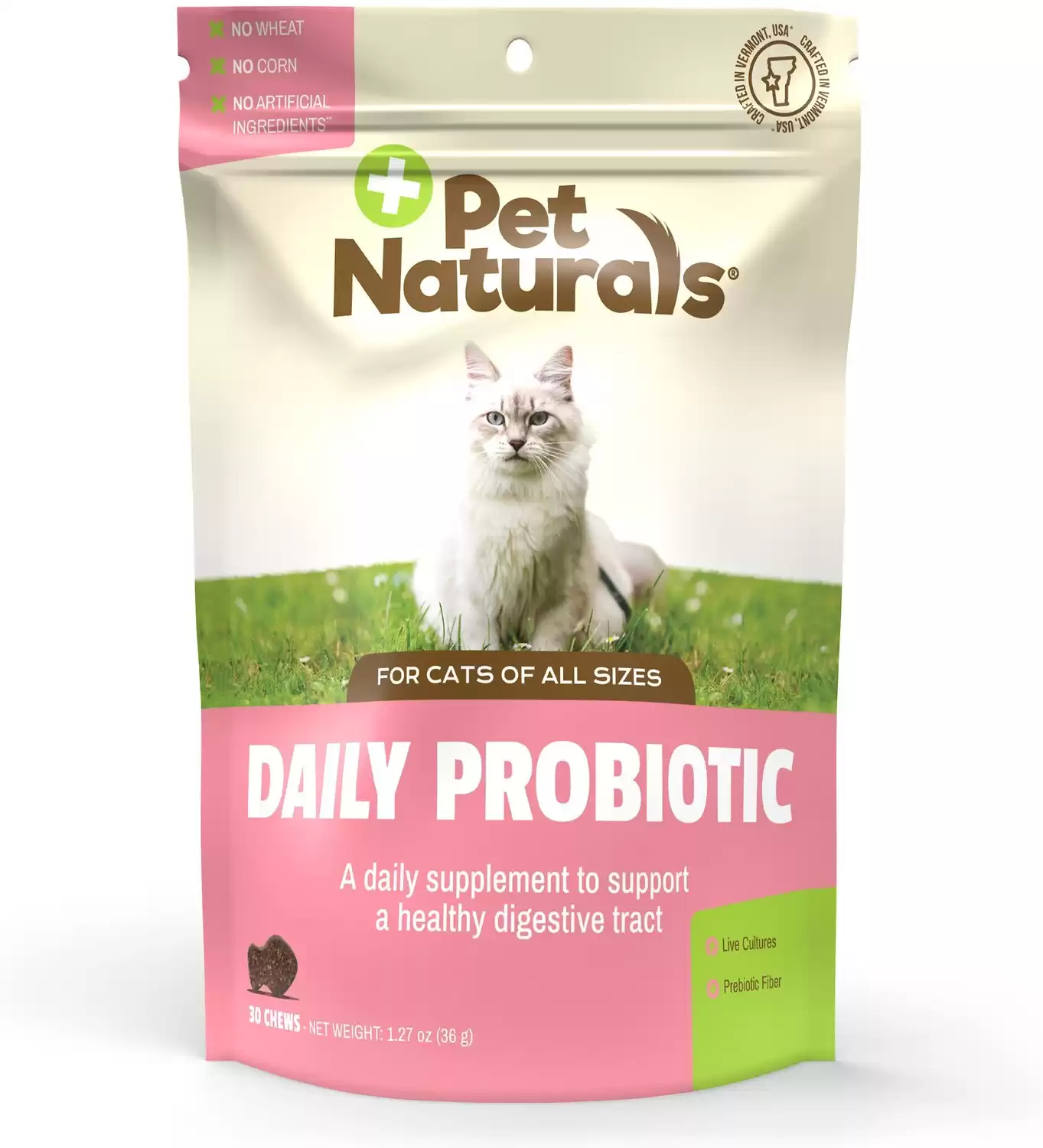 Check Chewy Check Amazon
Check Chewy Check Amazon- Comes as a duck-flavored chew
- The specialized strains of good bacteria will help your cat’s digestive system become more regular
- Contains both probiotics and prebiotics to support your feline’s entire immune system
- Contains GanedenBC30 that is verified as non-GMO by the Non-GMO Project
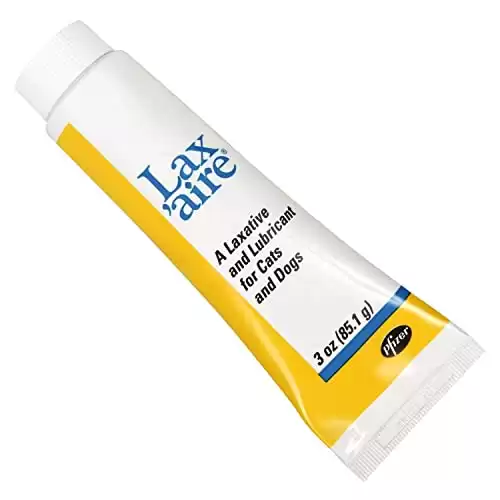 Check Amazon
Check Amazon- Can be used on both cats and dogs
- Can also be used for excessive hairballs
- Animals love the taste of the paste
- Has no side effects for most animals
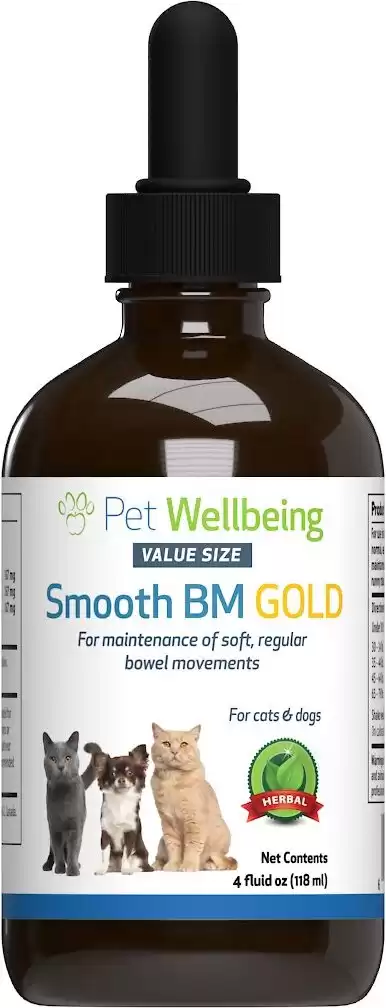 Check Chewy Check Amazon
Check Chewy Check Amazon- Also supports regular GI functioning in cats
- No bulking additives that can injure the cat's intestines
- Produced with organically cultivated herbs
- Can be used for a long time
A-Z-Animals Top Picks for Stool Softeners for Cats
#1 Best Overall: Pet Naturals Daily Probiotic Cat Chews
When it comes to finding the best of the best the Pet Naturals Daily Probiotic Cat Chews takes the cake.
By taking a daily probiotic that has specialized strains of good bacteria, your cat’s digestive system will become more regular. This product contains both probiotics and prebiotics to support your feline’s entire immune system.
The ingredients of this stool softener make it stand out from the competition. It has GanedenBC30 which is a strain of probiotics that is verified as non-GMO by the Non-GMO Project. Also, FOS, or Fructooligosaccharides, provide your kitty with prebiotics to create a healthy gut. This stool softener is guaranteed to provide CFU’s to the gut and to help with other problems such as gas and diarrhea too. Additionally, these chews are a tasty duck flavor to encourage your kitty to eat them!
Unfortunately, some owners found that their pets would not eat these chews unless they broke them up into smaller pieces.
Pros and Cons of the Pet Naturals Daily Probiotic Cat Chews
| Pros | Cons |
|---|---|
| This product contains probiotics, prebiotics, and specialized strains of good bacteria. | Some customers found their pets would not eat them unless they were broken up into smaller pieces. |
| It is guaranteed to provide CFU’s to the gut to help with constipation, blockages, gas, and diarrhea. | |
| It contains GanedenBC30 probiotics and Fructooligosaccharides prebiotics. |
- Comes as a duck-flavored chew
- The specialized strains of good bacteria will help your cat’s digestive system become more regular
- Contains both probiotics and prebiotics to support your feline’s entire immune system
- Contains GanedenBC30 that is verified as non-GMO by the Non-GMO Project
2. Best Lubricant: LaxAire Gentle Laxative and Lubricant for Cats
Our selection as the best lubricant is the LaxAire Gentle Laxative and Lubricant.
This product is a paste and works as a laxative. It is especially useful if your kitty suffers from excessive hairballs. This paste is designed to taste great to pets and it can be given to them directly or added to their daily meals. One of our favorite things about this option is that it can be used on both cats and dogs.
Unfortunately, a small number of customers reported that it made their pets lethargic, while others said that it lacked clear instructions on how to use.
Pros and Cons of the LaxAire Gentle Laxative and Lubricant for Cats
| Pros | Cons |
|---|---|
| This product is a paste form which can be given to pets directly or added to their food. | Some customers reported that it mae their pets lethargic. |
| It works as a laxative and is especially useful for cats with hairballs. | It lacks a clear instruction leaflet. |
| It can be given to dogs as well as cats. |
- Can be used on both cats and dogs
- Can also be used for excessive hairballs
- Animals love the taste of the paste
- Has no side effects for most animals
3. Best Liquid Stool Softener: Pet Wellbeing BM Gold Liquid Digestive Supplement
Whether your cat has dental difficulties or you just want a liquid stool softener that you can add to their food, we recommend the Pet Wellbeing BM Gold Liquid Digestive Supplement.
This product is made to not just assist with constipation, but also to support regular GI functioning in our feline friends. There are no bulking additives in this formula that might cause injury to your pet’s intestines. When other stool softeners add bulking agents in their ingredients, your cat may get diarrhea. Smooth BM Gold from Pet Wellbeing is produced with organically cultivated herbs and may be used for a long time.
However, this liquid softener is a more expensive option that the others on our list.
Pros and Cons of the Pet Wellbeing BM Gold Liquid Digestive Supplement
| Pros | Cons |
|---|---|
| This product supports regular GI function in cats. | This product is more expensive than the others on the list. |
| It contains no bulking additives. | |
| It contains organically cultivated herbs. | |
| It is suitable for long-term use. |
- Also supports regular GI functioning in cats
- No bulking additives that can injure the cat's intestines
- Produced with organically cultivated herbs
- Can be used for a long time
Some Causes of Feline Constipation
If you, as an adult, have ever suffered from constipation, then you know the types of things that can contribute to the condition. Animals like cats are not much different than us in what can cause them to get backed-up. Here’s a list of some factors that can cause constipation in your pet cat:
- Diet: Cats, like humans, need a healthy amount of fiber in their diets. When choosing a healthy type of cat food for your pet, read the labels to make sure that fiber is present in them. Too much calcium can also lead to constipation in your cat.
- Dehydration: Proper hydration is important to your cat’s overall health. Many cats don’t drink as much water as they should because they distrust standing water. If you cat isn’t drinking enough water, this can lead to constipation.
- Exercise: Does your cat lead a lazy, sedentary existence? Exercise plays a key role in helping animals to go to the bathroom normally.
- Elderly Cats: As cats age, they can naturally become more prone to health conditions like constipation.
- Medications: Medication such as antibiotics, pain medicines, and others can upset the balance of good bacteria in your cat’s stomach, leading to constipation.
- Health Conditions: If your cat is suffering from illnesses like cancer (tumors in digestive tract), hypothyroidism, kidney disease, or problems in the anal glands, your cat can develop constipation.
- Stress: Stress and anxiety have been found to cause physical symptoms in pet animals like cats, which can include issues with their bowels.
- Grooming: If your cat is over-zealous when it comes to grooming, it can cause them to consume too much hair, which can build up in their digestive tract, causing constipation.
Choosing the Best: What to Look For
Choosing the finest stool softener for your cat doesn’t have to be a chore. Pay close attention to the softener’s ingredients and form (such as liquid, chew, etc.) Most felines can benefit from any of the choices on our list, but those with dental concerns or kittens who are too young may require particular advice from your veterinarian. Below is a list of some ingredients that should be included in a quality cat stool softener:
- Probiotics: Probiotics do wonders to help cats that have bowel issues. Look at the products you are considering to see if they include one or more probiotics.
- Pumpkin: Pumpkin, which is high in fiber and moisture, can help to promote healthy bowel movements in your cat. Check for this ingredient when shopping.
- Fiber Supplements: Many cat stool softeners contain supplements that are high in fiber to aid your cat in having regular bowel movements.
- Psyllium Seed Husks: Found in products for humans, this ingredient is safe for cats and works as a trusted stool softener.
- Ginger: Ginger is a valuable source of fiber which can benefit your cat.
- Healthy Oils: Healthy oils like olive or mineral oil are good ingredients to look for in cat stool softeners, and can help cut down on the need for your cat to strain when going potty.
- Wet Cat Food: If you’re trying to avoid stool softeners, wet cat food is an excellent source of moisture, which helps to hydrate your cat, contributing to its overall bowel health.
The Different Types of Stool Softener for Cats: Pros and Cons Compared
Now that you know there are several types of stool softeners for your kitty, how do you know which one is best? Let’s take a look at the pros and cons of the different types of stool softeners for cats.
Chews
| Pros | Cons |
|---|---|
| Chew stool softeners can be given daily. | Smaller cats the need chews breaking up for them as they’re too large for them to eat. |
| They come in delicious flavors. |
Liquids
| Pros | Cons |
|---|---|
| Liquid stool softeners won’t upset your cat’s digestive tract. | Some cats don’t like the taste. |
| It can be a more expensive option. |
Pastes
| Pros | Cons |
|---|---|
| Pastes are the best option for cats with missing or sensitive teeth. | You might have to mix it in with food for your cat to eat it. |
| They often come in tasty flavors |
Our Criteria and Experience: How We Chose the Best
When compiling our list of the best cat stool softeners, we researched many different brands that are currently on the market to find those that are recommended by vets, were developed by animal experts, and came with high reviews from customers. Below is a closer look at our criteria for choosing a quality cat stool softener:
- Trustworthy Ingredients: We looked for products that contain safe, wholesome ingredients that are high in fiber, such as pumpkin, cod liver or fish oil, organic haritaki/amalaki/bibhitaki fruit (in our #4 recommendation), probiotic ingredients, and percentages of moisture.
- Flavor: What’s the point of a great stool softener if your cat won’t ingest it? We looked for products that contained flavors your cat will love like duck, bacon, or other desirable flavors.
- Texture: Because your cat’s needs can vary when ingesting supplements, we provided options on our list in liquid form, soft chew, and paste.
- Price: While a quality cat stool softener is going to run as much as $40, we provided options that are quite affordable if you’re having to give your cat stool softeners on a regular basis.
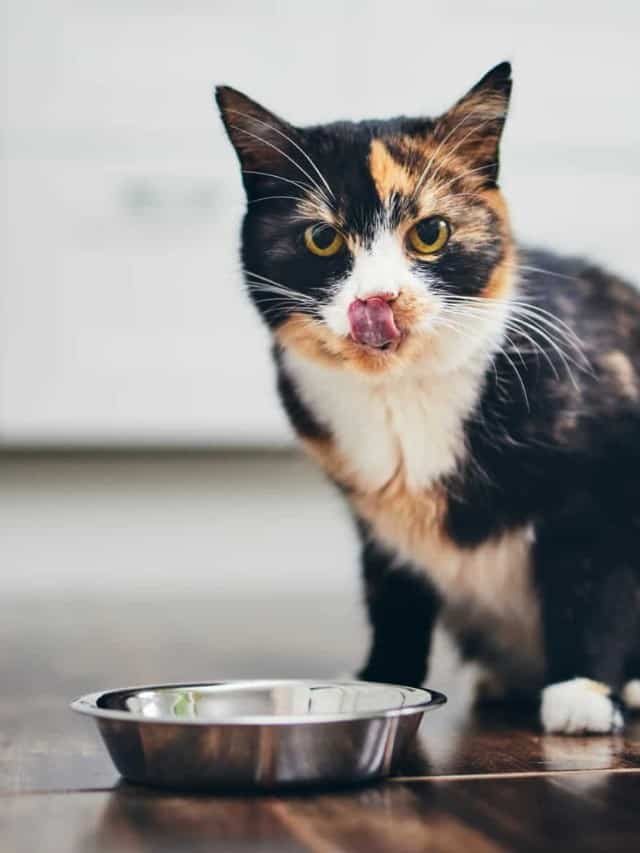
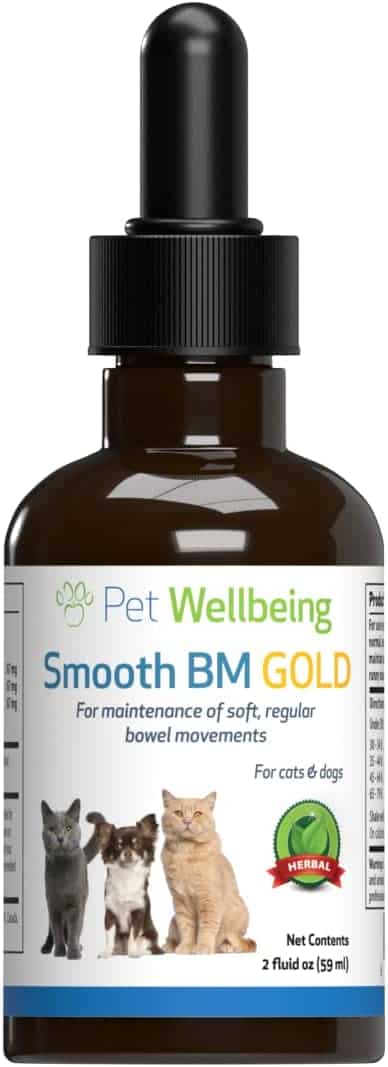
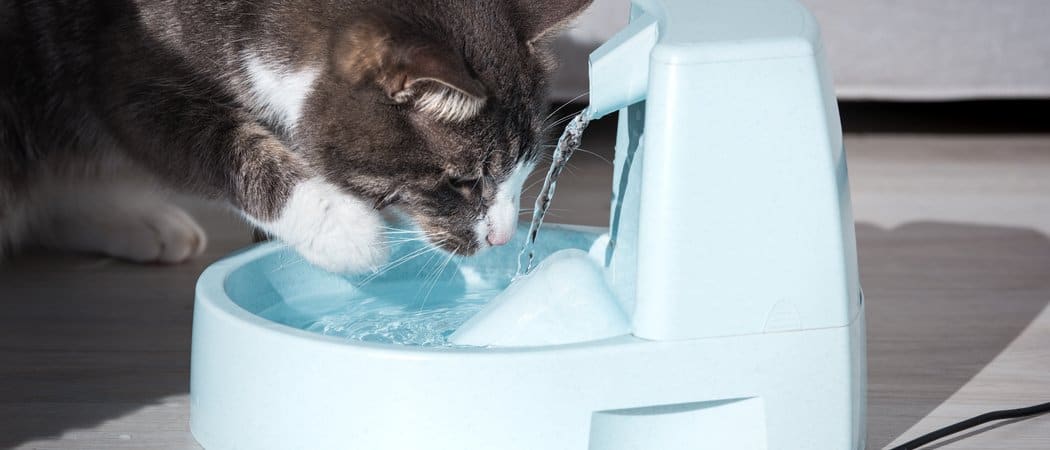
Up Next…
- Our Top Choices for the Best Cat Water Fountains — Cat water fountains will encourage your cat to drink more water. See our list of the best ones that money can buy.
- The Best Cat Tunnel: Reviewed and Ranked — Tunnels provide lots of fun for cats, and come in a variety of designs. Check out the best cat tunnels in our review.
- The #1 Grain-Free Cat Food for a Healthier Pet — Many cat parents are switching to grain-free food for their felines. Find out which grain-free cat foods are among the best in this review.
| Best for | Product |
|---|---|
| Best Overall | Pet Naturals Daily Probiotic Cat Chews |
| Best Lubricant | LaxAire Gentle Laxative and Lubricant for Cats Dogs |
| Best Liquid | Pet Wellbeing BM GOLD Liquid Digestive Supplement |
The Best Stool Softener for Cats: Reviewed and Ranked FAQs (Frequently Asked Questions)
Is milk a laxative for cats?
For cats suffering from constipation, some vets may prescribe a tiny amount of milk. The lactose in milk draws water into the bowels, which can help things go along.
Thank you for reading! Have some feedback for us? Contact the AZ Animals editorial team.

